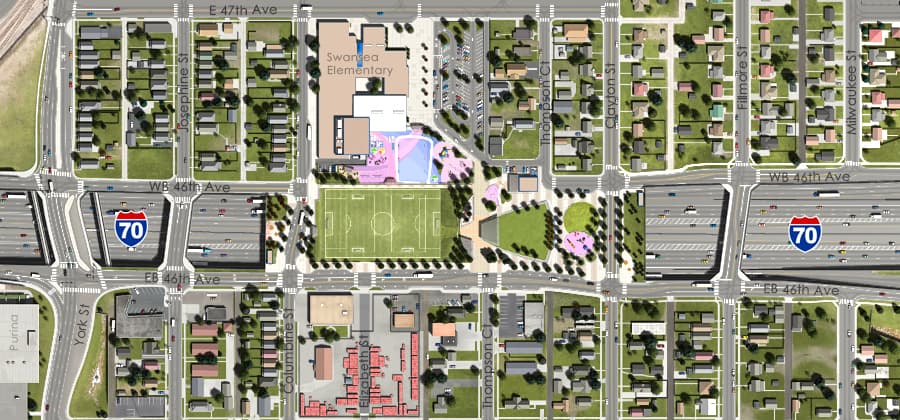A federal judge declined to freeze the rebuilding of Interstate 70, dimming hopes for those who oppose the massive infrastructure project. The latest development is "very bad" for the legal effort to stop construction of the highway project, according to Aaron Goldhamer, attorney for the plaintiffs.
"As far as actually stopping I-70 from happening, that’s probably not going to happen through our set of claims," he said. However, other legal claims are still underway in the same lawsuit, and the battle could continue even if the highway is built, he said.
Read on for an explanation of the arguments and why they matter.
Quick catch-up: This is the I-70 plan.
The plan is to rebuild 10 miles of Interstate 70, from Brighton Boulevard to Chambers Road, at a cost of well over $1 billion.
This includes the demolition of the elevated highway viaduct that runs for 1.2 miles through northeast Denver. It was built in the 1960s and, according to the authorities, is in poor shape. Environmental planning for the replacement project started in 2003 or earlier.
Part of the rebuilt highway -- from Brighton to Colorado boulevards -- would run in a trench up to 40 feet deep, with about 1,000 feet covered with a "public space" cap. The project would add a new express lane in each direction.
The whole project is known as Central 70. Construction is set to start this year.

And this is the lawsuit.
Developer Kyle Zeppelin and a coalition of local residents had asked that Judge William Martínez order a stop to the I-70 project.
The plaintiffs focused on a separate but connected project: Platte to Park Hill, or P2PH, a $300 million system of flood controls. It includes stuff like the rebuilding of two golf courses and construction of a greenway drainage channel in the Cole neighborhood. It's already in construction.
The flood-control project will protect I-70, saving CDOT from building more of its own structures to handle floodwater near the highway. In exchange, CDOT is paying millions of dollars to the city of Denver to help build P2Ph. (It also will protect a swath of the city, which I explained here.)
Here's where it gets thorny: Since the two projects are closely connected, the plaintiffs argue that the flood control is essentially part of the highway project. If that's true, then it arguably should have been subject to the environmental rules that govern highway construction and other federal-related stuff.
They wanted the defendants to go through the environmental assessment process again, which at the least would have been a significant delay for the I-70 rebuild. Basically, it was an effort to bring more of the flood-control project into a federal environmental review.
The current approach "short-circuits the entire point of the law," Goldhamer said. "The public needs to have the opportunity to make comments and give input so hopefully the best decision is reached, or at least all the factors are considered.”

Here's why the judge didn't agree:
The judge found that Denver could build the flood-control project no matter what happens to I-70. He didn't buy the idea that the city project was inextricably connected to the highway project -- and, therefore, he found it doesn't have to be brought into the intensive environmental review for the highway project.
The highway planners claimed that they had always planned to build their own flood controls, until they learned that plan would conflict with the city's existing flood-control plans, according to court documents.
The defendants "chose to redesign the conflicting part of (the highway's) stormwater diversion system to connect with the infrastructure Denver was building," the judge's order stated.
So, even if the judge shut down I-70, there was no proof that Denver would stop building the flood stuff, Martinez wrote.
In that case, CDOT and company would be in the "awkward position" of doing an environmental study of an action they have "no ability to influence or stop," the order states.
And the judge found that the environmental analysis and report on the highway project itself was good enough, though the plaintiffs wanted more intensive study.
What's next?
"This all started because of our concern for our health and that of our neighbors and for the wellbeing of all life in the area," wrote Kimberly Morse, one of the plaintiffs, in an email to Denverite.
Other plaintiffs included Brad Evans (of the design criticism group Denver Fugly) as well as Christine O'Connor, Jacqueline Lansing and Janet Feder.
Both sides will be waiting to see the results of another pending legal action against Central 70: In March 2016, the Sierra Club challenged the way that air pollution from the highway is measured. Meanwhile, Zeppelin said that the I-70 resistance will use upcoming elections to keep pressure on local leadership.
"The focus of the movement is on the 2018/2019 elections and holding leadership accountable for the impending boondoggle that will further displace and negatively impact thousands of minority residents," he wrote in an email to Denverite, noting that northeast Denver is already heavily polluted.












